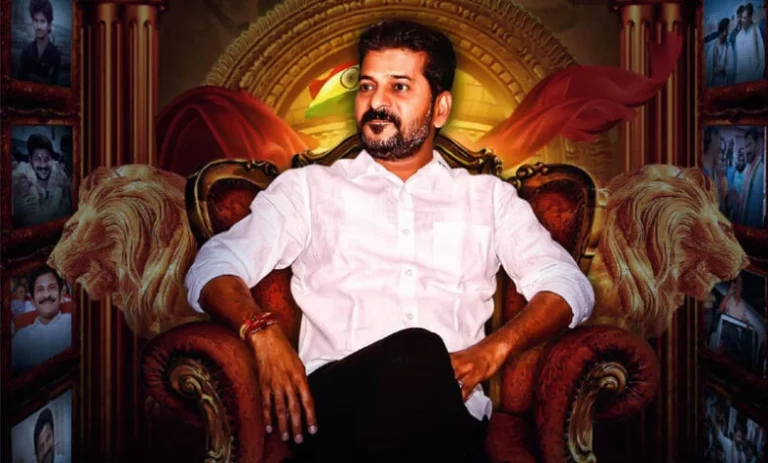Introduction: A Visionary Leader at Telangana’s Helm
Anumula Revanth Reddy—the dynamic Chief Minister of Telangana—is reshaping the state’s narrative through bold reforms and forward-looking governance. Since assuming office on December 7, 2023, he has set a new standard with his transparent leadership, development-focused policies, and an unwavering commitment to inclusivity.
Early Life & Political Ascent
Born on November 8, 1969, in Konda Reddy Pally, Mahbubnagar district, Revanth’s journey from a rural backdrop to the state’s highest office is rooted in early political engagement. A graduate of AV College, Osmania University, he was active in the Akhil Bharatiya Vidyarthi Parishad (ABVP) during his youth.
His political path—beginning with local elections in 2006—saw stints in the Telugu Desam Party (TDP), legislative assembly, and Lok Sabha (2019-2023). After joining Congress in 2017, he rose as a reform-focused leader, eventually becoming CM in 2023.
Reforms & Guarantees: A People-Centric Agenda
From day one, Revanth has leaned into a governance style rooted in accessibility and accountability. He renamed the state secretariat as Praja Bhavan, removed iron barricades, and invited the public to engage directly through “Praja Vani” sessions.
He followed up on campaign pledges swiftly—introducing free women’s bus travel, expanding health insurance under Arogyasri to ₹10 lakh, and implementing crop loan waivers worth ₹31,000 crore for 40 lakh farmers.
Transforming Education & Research
Education is central to Revanth’s vision. In a landmark move, he pledged ₹1,000 crore to develop Osmania University to the standard of global institutions like Stanford and Oxford.
His initiative included launching new dorms (Dhundubhi, Bhima), a digital library, and CM Research Fellowships and overseas scholarships to boost academic research and student exposure.
At a systemic level, he modernized attendance using facial recognition systems across schools and colleges, streamlined infrastructure under the EWIDC, and cleared pending mid-day meal and sanitation bills via “green channel” payments. Notably, he prioritized constructing toilets in girls’ schools, set up solar-powered container kitchens, and deployed female counsellors—framing education spending as an investment, not an expense.
Innovation & HealthTech: A Biodesign Revolution
Revanth is cultivating Telangana as a biotech and med-tech innovation hub, particularly through the “BioDesign” blueprint unveiled at the Innovation Summit 2025 in Hyderabad.
The state is fostering indigenous medical innovation by connecting researchers with universities, industries, and historical medical data—maintaining strict data privacy while promoting local solutions for Indian needs.
Sports Revolution & Youth Empowerment
Sport is another fulcrum of his reforms. The inaugural Telangana Sports Hub and the 32-page Sports Policy envision a complete overhaul—from grassroots athlete development to elite infrastructure.
Key features:
-
Launch of a Young India Sports University
-
16-fold increase in sports budget
-
Incentives for athletes, government jobs, and training programs
-
Collaborations with global institutions like FIFA, Abhinav Bindra’s academy, and more
-
Over 50 Centres of Excellence to nurture talent in residential schools.
Brand Hyderabad & Telangana Rising 2047
Revanth’s broader vision includes redefining Hyderabad and the state’s long-term economic trajectory. In his Independence Day address, he unveiled “Telangana Rising-2047”—a roadmap targeting a $1 trillion economy by 2035, and $3 trillion by 2047.
Urban transformation projects include:
-
“Brand Hyderabad” initiatives with Musi river rejuvenation
-
Development of Future City, greenfield highways, dry ports, metro expansion, new airports, and ring roads
-
Enforcement via HYDRAA, safeguarding civic assets and preventing encroachments.
Inclusive Governance & Social Outreach
Revanth has also embraced youth and social inclusion. He proposed reducing the minimum age to contest state assembly elections from 25 to 21, arguing that youth are already leading key administrative functions.
His administration also promotes social welfare through healthcare and gender-focused schemes. For example:
-
Cheyutha scheme under Arogyasri provides ₹10 lakh healthcare cover to nearly 90 lakh low-income families.
-
Maha Lakshmi scheme, offering ₹2,500 assistance, subsidized gas cylinders, and free TSRTC bus travel for female heads of households
Conclusion: Steering Telangana Toward a Progressive Tomorrow
Under Revanth Reddy’s leadership, Telangana is charting a path of ambitious reform—bridging innovation with governance, education with empowerment, and tradition with transformation. His policies reflect a holistic vision: inclusive, youth-centric, institutionally robust, and globally competitive—while rooted firmly in the welfare of Telangana’s people.
FAQs
1. Who is Revanth Reddy and when did he become Telangana CM?
Revanth Reddy is the second Chief Minister of Telangana, assuming office on December 7, 2023 under the Congress banner.
2. What key reforms has he implemented?
He has delivered free travel for women, expanded Arogyasri coverage, waived crop loans, renamed Pragathi Bhavan to Praja Bhavan, and initiated direct public outreach via “Praja Vani.”
3. How is he transforming education?
He’s investing ₹1,000 crore to elevate Osmania University, implementing facial recognition for attendance, improving infrastructure, and launching academic fellowships and scholarships.
4. How is Telangana becoming a healthtech and innovation hub?
Through the BioDesign initiative, Hyderabad is being positioned as a biodesign and medical technology center—linking researchers, data, and institutions for indigenous innovation.
5. What is the reform agenda for sports and youth?
The government rolled out a comprehensive sports policy with increased funding, a sports university, global training partnerships, and Centres of Excellence for youth development.
6. What’s the long-term vision for Telangana and Hyderabad?
“Telangana Rising-2047” envisions the state achieving a $1 trillion economy by 2035 and $3 trillion by 2047, supported by infrastructure projects like Future City, river rejuvenation, airport expansions, and institutional enforcement via HYDRAA.
7. How is his governance inclusive?
He has proposed lowering the assembly election age to 21 and launched welfare schemes like Cheyutha and Maha Lakshmi to uplift vulnerable communities and women heads of households
